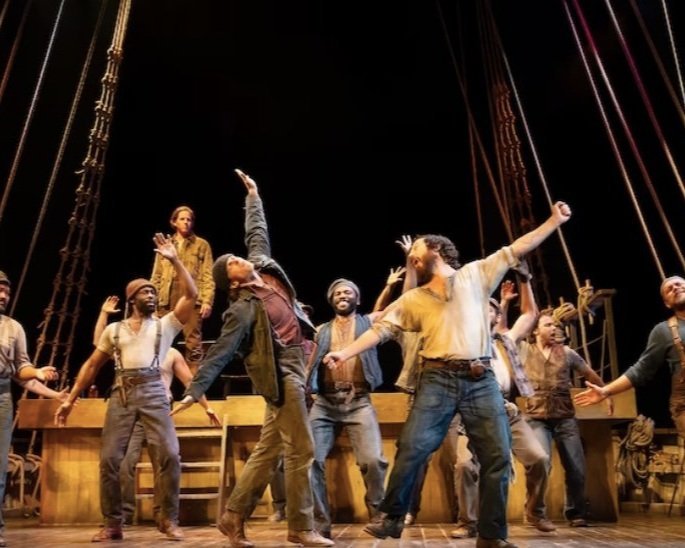Swept Away, a New Musical
"Swept Away” features music of the Avett Brothers and a book by John Logan (Julieta Cervantes/Arena Stage).
“Swept Away” a new musical with music by the Avett Brothers, inspired by an 1884 shipwreck tackles survival with an undertone of humanity that easily relates to audiences, largely thanks to the brilliant performances on stage. With John Gallagher Jr. at the helm, this vessel navigates uncharted waters with ease, transporting audiences into a story unlike any other seen in the theater. With a slightly imperfect, yet perfectly heartbreaking book by John Logan, Swept Away is able to depict the depth of a tragic play while showcasing the best of the jukebox genre in its mostly seamless weaving of the Avett Brothers’ music into its plot.
Audiences are transported the moment they step in the theater with Gallagher Jr. lying motionless on stage before the show begins. Swept Away begins at the end of the story, utilizing this motif to instill an uncomfortable tinge of tragedy in the audiences’ minds throughout its upbeat first act. By letting the audience in on its ending, Swept Away depicts its tone with ease and clarity. Throughout a deceptively upbeat, at times comedic first act, the audience is introduced to Mate (John Gallagher Jr.), Captain (Wayne Duvall), Little Brother (Adrian Blake Enscoe), & Big Brother (Stark Sands) along with a brilliant ensemble. Each with their own reasons for joining the expedition, the most beautifully choreographed crew on the high seas departs on a doomed whaling expedition.
“With John Gallagher Jr. at the helm, this vessel navigates uncharted waters with ease, transporting audiences into a story unlike any other seen in the theater.”
Director Michael Mayer is reunited with Gallagher Jr. (the two previously worked together on Spring Awakening & Green Day’s American Idiot) to once again bring out an award-worthy performance in his portrayal of Mate. Gallagher Jr. so flawlessly pulls off the at times demented Mate that the audience leaves convinced he must pull from real-life experience. In his perfectly crafted portrayal of despicable he somehow weaves glimmers of a human worthy of the audiences’ empathy into an individual who is the first to suggest cannibalism. Blescoe and Sands as Big and Little Brother contrast each other's performances brilliantly showcasing the competing roles of hope and reality. Duvall achingly portrays the antithesis of the youthful hope found in Blescoe’s Little Brother to show a captain at the end of his life journey. Along with the beautifully perfect four part harmonies by the main players, Sands’ technically perfect tenor vocals are worthy of a standing ovation on their own.
The ensemble, portraying the rest of the crew aboard the ship, adds an attention-keeping dimension to the first act that seems to be lacking in the second. This lack is picked up, however, by the emotion portrayed in the four main actors' rawly human performances, showing what lengths we will go to stay alive.
Julieta Cervantes/Arena Stage
John Logan’s book, in the second act, hits a depth unheard of in musical theater. Following Rachel Hauck’s (Hadestown) shockingly gripping set change that receives voracious applause on its own merit, the book descends into a thought-provoking tragedy. However, due to the lack of an ensemble and the confinement of the remaining characters to a small lifeboat, the pacing of the second act hits some rough waters. The dialogue feels slightly drawn out and pandering as the four men earnestly attempt to demonstrate a slow death whilst simultaneously trying to hold the audience’s interest. At points, it feels like the audience is waiting for the inevitable, annoyed at the prolonging of what is conspicuously coming. Perhaps this is exactly as the director intended and it’s clear why Mayer wants the audience in that spot. Nevertheless, Swept Away runs a fine line between dramatic intention and loss of audience participation.
In tandem, where the music of the Avett Brothers weaves perfectly everywhere else, the second half falls close to flat in one particular act two moment. The jarring nature of the upbeat mid-act song portraying Gallagher's descent into the deemed necessary evil of cannibalism is saved by its contrast in a haunting almost acapella first verse backed by violins that leads into an upbeat rock song about the devil in Gallagher’s brain.
Outside of these two minor storms, Swept Away soars into an undefined genre of Broadway that is likely to find much success beyond Arena Stage. Hauntingly leaving its audience to ponder what they would do to stay alive and how they would want to be judged, Swept Away will be anchored in the minds of many for a long time.
By Aidan O’Connor & Chase O’Brien

